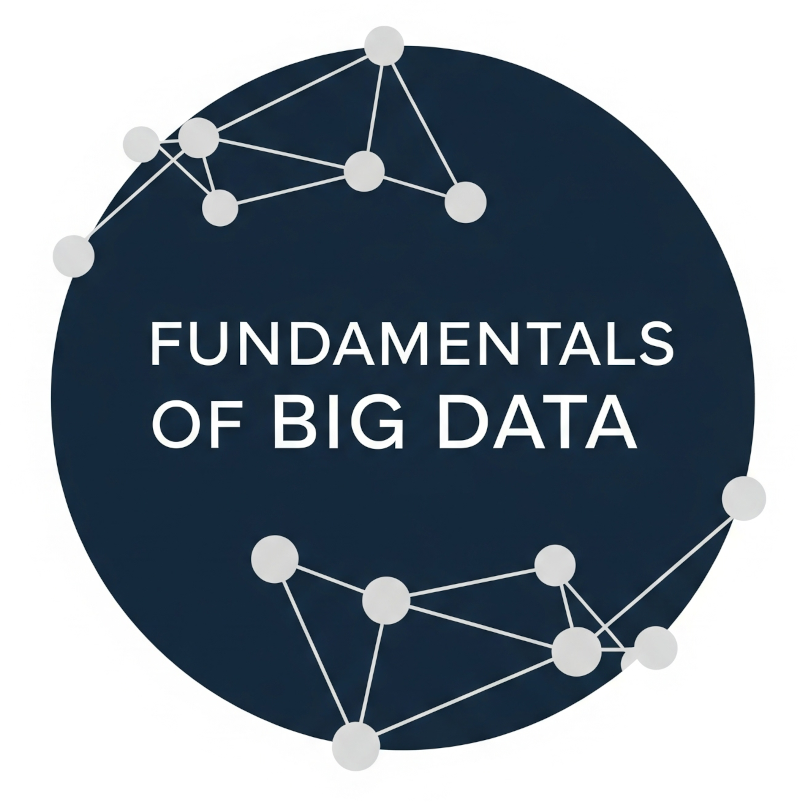BD-101

| Formats: | Asynchronous |
| Blended | |
| Online | |
| Onsite | |
| Part-time | |
| Level: | Beginner |
| Prerequisites: | |
| Recommended Knowledge | |
| Basic Computer Literacy | |
Formats: We offer our training content in a flexible format to suit your needs. Contact Us if you wish to know if we can accommodate your unique requirements.
Level: We are happy to customize course content to suit your skill level and learning goals. Contact us for a customized learning path.
Fundamentals of Big Data (BD-101)
Is the world of Big Data a mystery you're ready to unravel? In an era where data is generated at unprecedented speeds, understanding "Big Data" is no longer just for tech experts—it's essential for anyone looking to make informed decisions in a data-rich environment. From consumer trends to operational efficiencies, big data holds the key to unlocking immense value, but its complexities can be daunting.
This Fundamentals of Big Data course is your essential guide to navigating this new data frontier. Designed for business professionals, aspiring data enthusiasts, and anyone seeking a clearer understanding of the forces shaping modern business in South Africa, this course will demystify the core concepts, technologies, and applications of Big Data, empowering you to speak the language of data and identify its potential within your organisation.
Target Audience
This course is perfectly suited for a diverse range of professionals and aspiring individuals, including:
Business Managers & Executives
Seeking to understand Big Data's strategic implications for their organisation.
Business Analysts & Project Managers
Needing to work effectively with data teams and interpret big data concepts.
Aspiring Data Professionals
With no prior technical experience, looking for a foundational understanding to kickstart their journey.
IT Professionals
New to the Big Data landscape and requiring a conceptual overview of its components.
Prerequisite Skills
- Basic Computer Literacy: Familiarity with using a computer and navigating web browsers.
- A Desire to Learn: An open mind and eagerness to grasp new concepts.
- No prior programming, statistical, or specific technical knowledge is required.
What One Will Learn (Learning Outcomes)
Upon completion of this course, you will be able to:
- Define Big Data: Understand its core characteristics and why it's different from traditional data.
- Navigate the Big Data Ecosystem: Identify and describe the roles of key storage and processing technologies.
- Recognise Big Data Challenges: Understand the complexities involved in handling massive datasets.
- Identify Big Data Use Cases: Articulate how Big Data is applied across various industries to solve business problems.
- Differentiate Analytical Approaches: Understand the spectrum of analytics from descriptive to prescriptive.
- Grasp Cloud Big Data Concepts: Comprehend the advantages and basic offerings of cloud platforms for Big Data.
- Speak the Language of Data: Communicate effectively with data professionals and contribute to data-driven discussions.
Target Market
This course is aimed at individuals and organisations across all industries in **South Africa** who are looking to build foundational knowledge in Big Data, including:
Corporate Training Programs
Companies aiming to upskill their non-technical staff or management on data concepts.
Education Sector
Students and academics seeking an introductory understanding of Big Data fundamentals.
Small to Medium Enterprises (SMEs)
Business owners and staff wanting to understand how Big Data can benefit their operations.
Public Sector
Government employees and policy-makers seeking to leverage data for improved services.
Individuals
Looking to embark on a career in data or enhance their understanding of the data-driven economy.
Course Outline: Fundamentals of Big Data
This course provides a conceptual and comprehensive overview of Big Data, its underlying principles, key technologies, and real-world applications, requiring no prior technical experience.
Module 1: Introduction to the Data Landscape
- What is Data? Types, sources, and its growing importance.
- The Evolution from Traditional Data to Big Data: Drivers and differences.
- Why Big Data Matters: Understanding its business value and impact across industries.
- The Information Explosion: Scale, velocity, and variety of modern data.
Module 2: Core Concepts of Big Data
- The 5 Vs of Big Data: Volume, Velocity, Variety, Veracity, and Value.
- Challenges of Big Data: Storage, processing, analysis, governance, and security.
- Key Paradigms: Introduction to Distributed Computing and Parallel Processing.
- Big Data vs. Small Data: Knowing the distinction and implications.
Module 3: Big Data Ecosystem Overview - Storage
- Introduction to Distributed File Systems: Concepts of HDFS (Hadoop Distributed File System).
- Cloud Object Storage: Overview of S3 (AWS), Azure Data Lake Storage, and Google Cloud Storage.
- NoSQL Databases: Understanding different types (Key-Value, Document, Columnar, Graph) and their common use cases in big data.
- Data Warehouses vs. Data Lakes vs. Data Lakehouses (conceptual differences).
Module 4: Big Data Ecosystem Overview - Processing Frameworks
- Batch Processing Concepts: How large datasets are processed over time (e.g., MapReduce principles).
- Real-time/Stream Processing Concepts: Understanding data in motion (e.g., Apache Kafka, Apache Spark Streaming).
- In-Memory Computing: Introduction to Apache Spark's core advantages for speed.
- Overview of Big Data Query Engines (e.g., Hive, Presto/Trino - conceptual).
Module 5: Big Data Analytics & Use Cases
- Types of Analytics: Differentiating between Descriptive, Diagnostic, Predictive, and Prescriptive Analytics.
- Common Big Data Use Cases: Real-world examples across industries (e.g., IoT, Customer Analytics, Fraud Detection, Healthcare, Retail).
- Ethical Considerations in Big Data: Privacy, bias, and responsible data use.
- Basic Data Visualisation Concepts for Big Data Insights.
Module 6: Cloud Big Data Services (Vendor Agnostic Overview)
- The Rise of Cloud for Big Data: Advantages of scalability, cost-efficiency, and managed services.
- Overview of Key Services on AWS, Azure, and Google Cloud Platform relevant to Big Data.
- Understanding Serverless Computing in a Big Data Context.
Module 7: Future Trends & Career Paths in Big Data
- Emerging Technologies: Brief insights into Data Mesh, Data Fabric, MLOps, and Data Governance trends.
- Big Data Career Opportunities: Roles and skill sets in the data ecosystem.
- Next Steps for Learning: Pathways to deepen your Big Data knowledge.